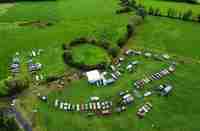How much ‘energy’ does it take to resuscitate a party?
There was one little phrase mentioned during his speech last weekend at the Fine Gael Ard Fheis that perhaps most succinctly and simply surmises what the near future holds for our new Taoiseach, Simon Harris – “lots to do”.
Because yes, between the looming pressure of elections and the myriad of prevalent national and international issues to contend with, there is “lots to do” indeed. And if ever in the recent past there was a Taoiseach emboldened to prove themselves by tackling the laundry lists of problems the Government’s been accused of mishandling all term, it could easily be argued to be Harris. His ascension to the country’s highest post, though in many ways quite predictable following Leo Varadkar’s relinquishment of the role, felt so speedy that it realistically could not have come about without at least some degree of scepticism from the public, and some sense of obligation, for Harris, to show it was indeed the right call.
Not only that, but in the wake of his appointment, many are also beginning to argue that if ever there was a Taoiseach in recent history actually likely to shake up the Government’s (or rather Fine Gael’s) approach to the problems-of-the-day, that it could well, once again, be Harris.
Fitting for his title as Ireland’s youngest ever Taoiseach, one buzzword which seems to have attached itself to coverage of our new leader is ‘energy’. Harris’s youth comparative to his political peers has been taken to imply he has quote-unquote ‘energy’, and having ‘energy’ has been taken to imply he may just have the drive and passion for change that the country’s found increasingly lacking in Government lately.
‘Energy’ is what Harris is going to breathe back into Fine Gael, into the Government, into Ireland in general… or so it is being supposed. ‘Energy’ is Harris’s greatest perceived signifier following Varadkar and (Micheál) Martin’s recent receptions. ‘Energy’ is Harris’s great advantage and his biggest advertising draw… although not least because the public don’t seem sure what else there is.
Because as much as the notion of heralding an infusion of ‘energy’ for Irish politics has been a major part of discourse and reception around the new Taoiseach, decidedly more so has been the perception that it remains uncertain what exactly we can expect of him.
Harris is by no means a totally elusive figure. In fact, if anything he’s been ubiquitous for years now, his stint as Minister for Health in particular having copperfastened him as a household name in national politics (unsurprising, given it overlapped with a global pandemic) – not to mention his time in other cabinet roles, such as in the Department of Higher Education and as a Minister for Justice stand-in. And while there are various successes and shortcomings to pick from his time in each of these roles, generally there seems to be a consensus that in sum, there is not much notable that can be used to accurately judge how he’ll act and fare as Taoiseach.
In his brief period as leader so far, Harris’s speeches have indeed confirmed him as someone who purports to strive to advocate for the most vulnerable in society, and he appears to have a finger on the most pressing issues to profess commitment to addressing. But he remains untested in several key areas. Some of the biggest issues facing a Taoiseach in today’s Ireland – such as the economy and Northern Ireland – are areas where his experience is limited and little is known of where his stances lie.
For all we know (and it wouldn’t be completely unreasonable to guess so), Harris’s approach to leadership and these issues may not be significantly dissimilar to his (fellow Fine Gael) predecessor, but the fact remains that as of now, we don’t really know yet. And in fact an argument could be made that by taking a wider view of the political landscape at the moment, particularly in the context of Fine Gael, it’s possible we could be in for something new.
Though he retained his centre-right, fiscally conservative reputation while Taoiseach, a major signifier of Varadkar’s time as leader was how he responded to societal changes and influenced the party towards more liberal social positions than many of his predecessors. In his absence, it remains to be seen how the debate such influence sparked within Fine Gael will play out; under Harris, will this trend solidified by Varadkar continue, or will the party return to the centre-right position that some of its TDs have been advocating for?
There is a reason (besides his age) that Harris’s ‘energy’ has been so routinely emphasised over the past couple of weeks. Thirteen years in power, no matter how you play it, begins to taste like fatigue eventually. And Fine Gael are by no means an exception.
Adopting a new leader, particularly one as relatively inoffensive in preceding reputation as Harris, could be a facelift for Fine Gael. It could be the perfect opportunity to re-position themselves a bit and brighten their reputation, just in time for the forthcoming elections. One need only look at last month’s referenda as an isolated example to see the overwhelming signs of a public sick and tired of how their Government is showing (or indeed not showing) up for them, so it’s clear some re-jigging of some sort is going to be necessary for the party.
The details of what Fine Gael will stand for under its new leadership are not known, because neither are Harris’s opinions. And neither is it known just how much in-party pressure there is to return to older ways. But even if Harris does have big ideas, he is going to be constrained in any big changes he wishes to make at this stage of the Governmental term – I can’t see his coalition partners being too enthusiastic regarding major late additions to the legislative programme.
And if Harris is going to be somewhat restricted in what he can actually get done as leader in the near future, it’s fair to say that a large part of the road ahead of him is going to have this June and next year’s elections as the destination in mind, the thing to work towards. Fairly or unfairly, ultimately his success as Taoiseach for the next year will be based on how well Fine Gael fares in these elections, how well they are able to shake off that air of fatigue that’s become attached to them.
Yes, Harris has brought a bit of ‘energy’ to a spent Fine Gael right before an election year, right when they need it most – but how much ‘energy’ does it take to resuscitate a party whose reputation is thirteen-years stale?






